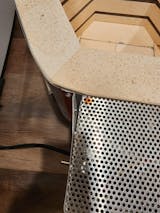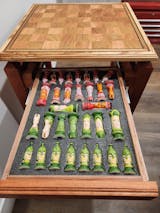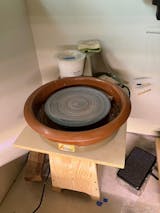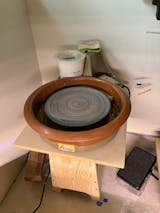I received my kiln five days ago and have already fired it four times. I've been playing around with some of the, easily modified, firing parameters while firing test pieces. Turns out the default STD program works the best for my needs.
All I need the kiln for is to fire a large assortment of bisque chess sets. I've got 80 different Mayco glazes to experiment with and now I can do that at my leisure! The kiln makes testing glaze combinations simple and accurate. Being able to re-fire pieces, at will, is nice for obtaining the quality I'm aiming for too.
There was one small, minor imperfection with the kiln itself. This defect is shown in the picture below. It looks to me like somebody at the factory noticed it and then said screw it, ship it anyway. As the kiln arrived two weeks earlier than I expected, I'm not going to whine about a small dent in some non critical part.
All in all, if you want a small EZ to use kiln for firing bisque pieces, then this is the kiln for you! It is easily moved when not in use. It fits into a corner, with ample space on all sides, during firing. The apartment has a dedicated 20A line for the washing machine so that's the plug I use. The only thing is I can't use my washer and kiln at the same time. OK, not a big deal.
You'll start to the pieces I'm firing, along with the chess tables, on my IG account soon. Just look for EZInlays. I'll be tagging @SoulCeramics when I post fired pieces too. I promise.
Thanks guys, Happy Camper here!!!
Have an Ordinary Day...
Kurtis ~|:-)
I am always happy to give my business a small family run business. Soup Ceramics was wonderful to work with. Highly recommend!
Received my 1st kiln! Yay! I'm slowly getting to know it's workings. I have a small studio, so it works great in my space! It came in a timely manner and was very well packed!
I ordered a refurbished kiln and received it quickly. It’s basically brand new but was more affordable. Super happy with the ease of the process and great communication.
We hadn’t had time to fire our kiln until recently and our pieces came out so beautiful! The kiln is very easy to use and I love how it doesnt take up too much space. It was a father’s day gift for my husband and he loved it very much! Thank you to the amazing customer service for all of their help in purchasing a kiln and getting it shipped out fast!
Soul ceramics has incredible service, quick shipping, and has been quite helpful. My Speedball wheel was exactly what I was looking for my small space at home as a hobby potter.
It’s exactly what I was expecting and it works great. Soul Ceramics has great communication, everything went really well.
I needed some Speedball Underglazes and found Soul Ceramics online. My order was processed and filled easily. Thank you Soul Ceramics.
I got the best price and service from Soul Ceramics. I looked at other dealers but came back and bought the KH 414 from Soul Ceramics. The have very good service overall. they answer emails too.
I've been looking at getting this wheel for a long time. I started with the skutt 1/2hp and it's so heavy and not portable I wanted a fun wheel I could take places and teach my friends pottery or do art shows with. This wheel is strong and amazing quality for the price. And if you really wanted to you could add legs and make it a full wheel but it's comfortable just sitting on the floor to throw on it. I love this wheel and I am so glad I went through soul ceramics to get it, the customer service is great and they have the best prices for speedball wheels.

















